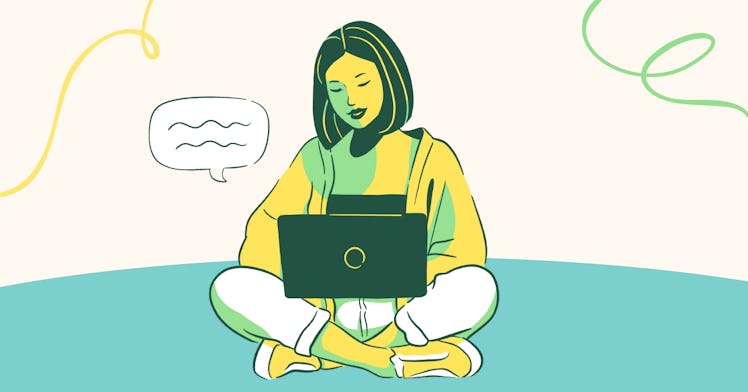
More Than 2 Million People Have Used The At-Home Therapy Platform Betterhelp — Here’s How It Works
We only recommend products we love and that we think you will, too. We may receive a portion of sales from products purchased from this article, which was written by our Commerce team.
I make my living as a writer, which I absolutely love 99% of the time. Health insurance, or lack thereof, has been the one glaring exception. More often than not, during the course of my career, I’ve gone uninsured due to being part-time and freelance at various companies, which made finding a therapist either ridiculously expensive or downright impossible. Personally, I don’t believe anyone should have to choose between their mental health and their livelihood (or anything else that may stand in the way), which is why I’m a massive proponent of services that aim to make it easier and more affordable. That’s what BetterHelp is trying to do.
FAST FACTS:
- Over 25,000 licensed, experienced therapists in the network
- Matches you with your therapist based on a questionnaire that covers goals, communication style, and more
- Chat with your therapist over messaging, phone, or video
- Allows you to switch therapists/cancel your subscription
- Subscription model — $65 a week for one live session and bonus resources
- Doesn’t work with insurance
- Not able to give a clinical diagnosis or prescribe medications
How Does BetterHelp Work?
The BetterHelp process begins when you sign up online. You fill out a questionnaire, which starts with the type of therapy you’re looking for (individual, couples, or teen), and goes on to cover info about your gender identity, age, therapist expectations and preferences, and mental health needs. BetterHelp then uses this information to match you with a therapist within 48 hours.
All of the therapists on the BetterHelp platform are licensed, trained, experienced, and accredited professionals. Depending on your needs, you’ll find psychologists (Ph.D./PsyD), licensed marriage and family therapists (LMFT), licensed clinical social workers (LCSW/LMSW), or licensed professional therapists (LPC), all of whom have a masters or a doctorate degree in their field.
Your subscription with BetterHelp doesn’t start until you’ve chosen your therapist. After that, you’re billed monthly for your once-weekly sessions, unlimited messaging, and more bonuses. While all of your sessions are conducted remotely, you can communicate with your therapist however best suits your schedule and preferences whether that’s through messages, live chatting, phone calls, or video sessions.
In terms of privacy, BetterHelp takes measures to safeguard the information you provide. Most notably, you can even stay anonymous throughout the whole process (sans providing your contact info, which is accessed only during emergency situations) by inputting a nickname during sign-up.
How Much Does It Cost & What Do You Get?
BetterHelp costs $65 a week (billed monthly). With that, you get one live therapy session per week, unlimited messaging with your therapist, and access to mental health resources like group sessions, webinars, worksheets, and journaling tools.
While the $260-per-month fee might seem steep, keep in mind that, on average, traditional therapy costs $150 per session. You can also get 20% on your first month.
Finally, you can cancel your subscription or change your therapist at any point.
Who Is It Not For?
Online therapy may not be for everyone. Some people may benefit from in-person therapy, and it’s important to know that the platform can’t provide clinical diagnoses or prescribe medications.
BetterHelp doesn’t submit insurance claims and at more than $250 a month, it’s not affordable for everyone. It’s also unlikely that you can submit to an insurance company later and get reimbursed.
However, as mentioned earlier, you can cancel your subscription at any time should you decide that Betterhelp is not right for you.
What Reviewers Have To Say
As previously noted, all of the 25,000-plus therapists within the BetterHelp network are licensed. These experts receive dozens of positive reviews, with people writing things like: “very compassionate,” “very knowledgeable,” “so helpful,” “responds quickly and actually cares,” “real,” and “has changed my life for the better.”
In terms of the remote structure, many people (like myself) find it to be much more convenient than in-person therapy. For one, there’s no travel involved, and for another, you can conduct your sessions in a familiar, comfortable environment. Personally, I find it easier to be vulnerable with my therapist through a screen, and I’m not the only one: “I am new to therapy,” one reviewer wrote, and “it couldn't be more convenient to talk to someone from my home via video call. I'm really glad I decided to join and start this journey towards bettering myself.”
Whether you’re looking to try therapy for the first time or you’re searching for a more affordable, convenient option, get 20% off your first four BetterHelp sessions.
If you or someone you know is seeking help for mental health concerns, visit the National Alliance on Mental Illness (NAMI) website, or call 1-800-950-NAMI(6264). For confidential treatment referrals, visit the Substance Abuse and Mental Health Services Administration (SAMHSA) website, or call the National Helpline at 1-800-662-HELP(4357). In an emergency, contact the National Suicide Prevention Lifeline at 1-800-273-TALK(8255) or call 911.
This article was originally published on